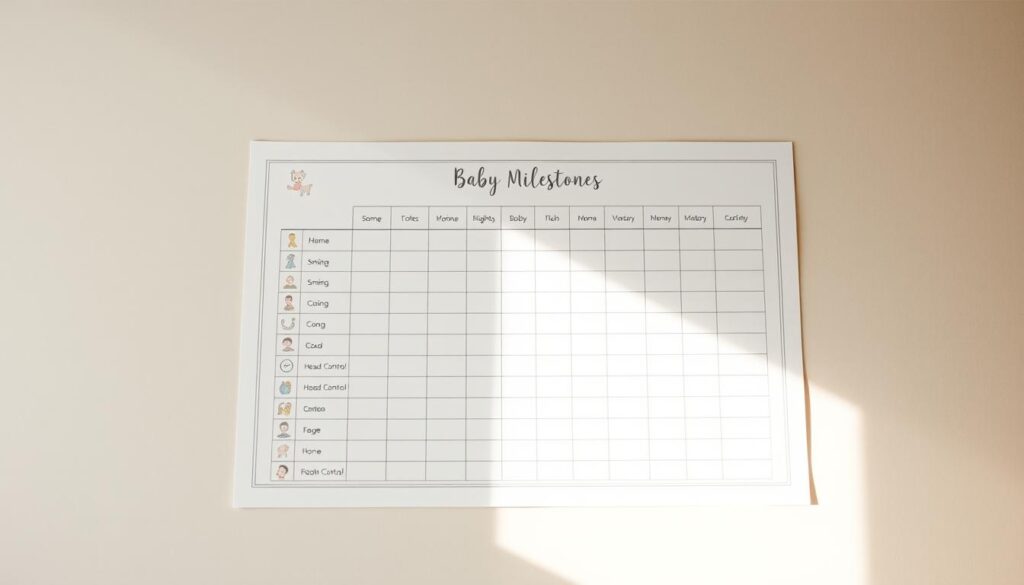Have you ever wondered how much a baby can grow in their first three months? This time is called your baby’s amazing leap in 0-3 months. It’s filled with big changes that might surprise you.
During these early months, your baby will hit important milestones. These milestones help shape their growth and set the stage for the future. Knowing about these early months is key for good baby care. It helps you create a nurturing space for your baby.
In this guide, we’ll explore the amazing changes your baby goes through. We’ll also give you a baby milestones tracker. This tracker will help you keep up with your baby’s progress. It makes being a new parent a rewarding experience.
- Your baby’s development during the first three months is rapid and transformative.
- Understanding newborn growth stages is essential for effective parenting.
- A baby milestones tracker can help you keep tabs on your baby’s progress.
- A nurturing environment fosters healthy development and emotional well-being.
- Establishing baby care routines early can ease the transition into parenthood.
- Documenting milestones can create cherished memories for you and your baby.
Understanding Early Development: What to Expect for 0-3 Months
The first three months are big for your baby. They change a lot. These early weeks are key for their growth.
For baby development stages, you’ll see some cool things:
- Lifting their head while lying on their tummy
- Tracking objects with their eyes
- Beginning to smile in response to stimuli
These newborn growth and milestones show how your baby is doing. They get stronger and better at moving. They also start to understand their world and react to sounds.
Feeling emotions is important too. It helps you bond with your baby. Seeing these growth milestones baby helps you know how they’re doing. It also helps spot any issues early.
Your Baby’s Amazing Leap in 0-3 Months: Navigating Growth, Milestones, Routines

In the first three months, your baby goes on an amazing journey. They learn fast, showing big changes in their skills. This is called your baby’s amazing leap in 0-3 months.
They start to notice things more and get curious about the world. It’s a time of big growth and learning.
These early weeks are full of big steps. Your baby will go through three main leaps. These are the World of Sensations, Patterns, and Smooth Transitions.
Each leap is a big step in their brain and heart growth. Knowing about these leaps helps you make routines that help your baby grow and feel safe.
Setting up good routines makes this time easier. A regular schedule for eating and sleeping is key. Also, giving them chances to explore with their senses is important.
Seeing your baby learn new things is very rewarding. It shows you their unique personality and skills.
By noticing and celebrating infant developmental milestones, you help your baby grow. Knowing these leaps help your baby become more independent. This makes your parenting journey even more special.
Growth Milestones: Key Indicators of Baby Development

Watching your baby grow is exciting. You’ll see them get bigger, learn to hold their head up, and move their arms and legs. These signs show how they’re doing and help them grow more.
Physical signs are easy to see. In the first few months, they will start to gain weight. This is a good sign they are growing well. Around 2 to 4 months, they will start to hold their head up. This shows they are getting stronger.
But, things like family traits and where they live also matter. Every baby grows differently. It’s important to notice these differences and support their growth. Celebrating these milestones is key. It shows they are not just getting bigger, but also getting better at things.
Introducing Infant Developmental Milestones
![]()
Tracking your baby’s growth is very important, even in the early months. A baby milestones tracker helps you see and record important steps. Each infant milestone is key, guiding parents to watch their child’s progress.
Knowing these milestones lets you celebrate your baby’s wins and know when to ask for help. Remember, every baby grows at their own speed. Here’s a list of important milestones from 0 to 3 months:
- 1 month: Can lift their head briefly when on their tummy.
- 2 months: Begins to smile at people and follows movements with their eyes.
- 3 months: Pushes down on legs when feet are on a hard surface and can hold a toy and shake it.
Watching these milestones helps you understand your baby’s growth better. This knowledge helps you support your child well in these early weeks.
Feeding Your Newborn: Establishing Early Routines

Feeding routines are key for your newborn’s growth in the early months. They help your baby get the food they need. They also make you feel more sure about caring for your baby.
Newborns can eat in different ways. They might drink milk from a bottle or nurse from you.
It’s important to know when your baby is hungry. Look for these signs:
- Smacking their lips
- Turning their head toward your hand when it touches their cheek
- Putting their fists to their mouth
Make feeding time a cozy spot for bonding. It helps your baby feel safe and digest food better. Try to feed in a quiet place, whether you’re nursing or using a bottle.
Feed your baby at regular times. But, listen to their hunger cues. Newborns usually need to eat every two to three hours.
Make feeding a special time to bond. Be flexible with feeding methods. Every baby is different. This helps you and your baby as you figure out feeding routines.
Sleep Patterns in Infants: Understanding Their Needs

It’s key to know about infant sleep patterns for their early growth. Newborns sleep 14 to 17 hours a day. But, their sleep is in short, more frequent periods. Knowing these needs helps you manage their sleep better.
Your baby’s routine will have many naps a day. These naps can last from 30 minutes to 3 hours. It might be hard for new parents, as babies wake up often for feedings and comfort. Their sleep patterns are different from adults, being more broken at first.
To make a calm sleep space and better sleep habits, try these tips:
- Make a consistent bedtime routine.
- Keep the sleep area dark and quiet.
- Use gentle sounds or soft lullabies to soothe your baby.
- Avoid stimulating activities before sleep time.
By understanding and meeting your baby’s sleep needs, you create a peaceful place for rest. This benefits both you and your baby.
Fostering Connection with Your Baby: Play and Bonding Activities

Bonding with infants is key for their growth. Quality time with your newborn through fun activities builds a strong bond. Play helps your baby grow and learn.
Here are some play ideas to help bond with your baby:
- Tummy Time: Lay your baby on their stomach. It strengthens their neck and shoulders. It also lets them see the world.
- Visual Stimulation: Use bright toys or flashcards. They grab your baby’s eye. This helps their eyes track better.
- Gentle Singing: Sing soft songs or nursery rhymes. It calms your baby. It also helps their hearing.
- Interactive Play: Play simple games like peek-a-boo. It makes your baby laugh and feel connected.
- Reading Together: Read picture books with your baby. They can touch the pages. They hear your voice.
These activities help your baby’s brain grow. They also make your baby feel safe and loved. Playing together makes your bond stronger.
Navigating Growth Spurts in Infants: What Parents Should Know

Understanding growth spurts in infants can be tough. But knowing these phases helps you support your baby’s growth. In the first three months, you might see your baby get fussier or want to eat more. These signs often mean your baby is growing fast.
As a parent, you need to be patient and flexible. During growth spurts, your baby might want to eat more and need extra comfort. Knowing when your baby is growing helps you meet their needs better. Here are ways to help babies through growth phases:
- Keep track of feeding times and amounts to detect changes in appetite.
- Provide a calm environment that promotes relaxation.
- Offer extra cuddle time and skin-to-skin contact to soothe your baby.
These changes usually don’t last long. Paying close attention to your baby’s signs makes growth spurts easier for both of you.
Parental Well-Being in the First Quarter: Tips for Caregivers

In the first months of being a parent, taking care of yourself is key. As a caregiver, it’s important to not forget about your own needs. It can be hard to balance caring for a baby and taking care of yourself.
Here are some tips to help:
- Share tasks with your partner or family to make things easier.
- Make time for yourself, even if it’s just a few minutes a day.
- Connect with friends or join parenting groups to share and get support.
- Try stress-reducing activities like meditation or yoga to stay calm.
It’s not selfish to take time for yourself. It shows you care about your family’s health. By taking care of yourself, you create a better space for your baby to grow.
Infant Routines and Schedules: Finding What Works for Your Family

Setting up baby routines can be tough, but it’s key for your baby’s health and your family’s happiness. Every baby is different, so finding routines that fit your life is important. Being flexible is key as you figure this out.
Putting together a schedule for eating, playing, and sleeping can help things feel steady. But, don’t forget to leave room for changes. Your baby might need more food or sleep some days. Being able to adjust helps everyone feel more at ease.
Here are some tips for setting up good routines and schedules for your baby:
- Observe your baby’s natural rhythms: Watch when they seem most awake, hungry, or tired.
- Incorporate family activities: Make your baby’s routines match your family’s to bring everyone together.
- Document changes: Keep notes on your baby’s likes and dislikes to help adjust their routines.
Finding the right routines for your family takes time. But, routines that meet your baby’s needs help create a caring space for everyone. With patience and love, you’ll find a schedule that works for you and your baby.
Looking back on your baby’s first three months is special. It shows how much they’ve grown. You’ll see big changes that show their growth and help you bond with them.
These milestones are important. They help you feel closer to your baby. They also help your baby grow.
Watching your baby grow is exciting. You’ll see changes in how they sleep, eat, and play. Every baby is different. Being flexible helps your baby feel safe and loved.
Parenting in the early months is about patience and love. Tracking milestones helps you adjust to your baby’s needs. This creates a loving space for growth.
Use resources to help you keep up with your baby’s growth. This journey is beautiful. Enjoy it with confidence.

